Starting couple therapy can feel both hopeful and intimidating. Many couples enter therapy unsure of what to expect, yet eager to improve their relationship. The first session is an essential step in setting the foundation for the therapeutic journey. Understanding what typically happens in a first couple therapy session can help alleviate anxiety and prepare you for a productive experience.
Why Couples Seek Therapy
Couples may choose therapy for various reasons, including:
- Communication issues: Struggles with expressing feelings, listening, or resolving conflicts.
- Trust issues: Often stemming from infidelity or dishonesty.
- Life transitions: Such as marriage, parenthood, or retirement.
- Emotional distance: Feeling disconnected or unfulfilled.
- Recurring conflicts: Patterns of arguments that seem unsolvable.
- External stressors: Financial problems, job loss, or family pressures.
Regardless of the issue, the goal of therapy is to provide a safe space where both partners can work toward understanding and resolving their challenges.
Preparing for Your First Session
Before your session, take time to reflect on your goals and concerns. Both partners should consider:
- What do you hope to achieve through therapy?
- What are the key issues you want to address?
- Are there specific behaviors or patterns you’d like to change?
Being prepared to discuss these topics can help the therapist understand your needs and create a customized approach to help you both.
What Happens During the First Session
The first couple therapy session is primarily an introduction. It sets the tone for future sessions and provides the therapist with the information needed to guide you effectively. Here’s what you can generally expect:
Introductions and Setting Expectations
The therapist will begin by introducing themselves and explaining their approach to therapy. They may provide insights into their methodology, whether it’s solution-focused, emotionally focused therapy (EFT), or cognitive-behavioral therapy (CBT). This is your opportunity to ask questions about their style and what to expect in subsequent sessions.
Key Topics Covered:
- Confidentiality rules and limits.
- The structure of future sessions.
- The therapist’s role as a neutral facilitator.
Understanding the Relationship History
Your therapist will ask about your relationship’s background to gain a better understanding of your dynamics. Questions may include:
- How did you meet?
- What drew you to each other initially?
- What major milestones or challenges have you faced together?
These questions help the therapist identify patterns and strengths within the relationship.
Identifying the Issues
The therapist will guide you in articulating the issues that brought you to therapy. Each partner will have a chance to share their perspective without interruption.
Important Points:
- The therapist may ask clarifying questions to fully understand the concerns.
- They will encourage open, honest, and respectful communication.
- This is not a time for assigning blame but for expressing feelings and needs.
Exploring Goals for Therapy
Together with the therapist, you’ll establish goals for your sessions. These goals should be specific, realistic, and mutually agreed upon. Examples might include:
- Improving communication skills.
- Rebuilding trust after a breach.
- Reducing the frequency or intensity of conflicts.
The therapist may ask, “What would success in therapy look like for you as a couple?”
Assessing Individual Perspectives
While the focus is on the relationship, the therapist will also explore each partner’s individual experiences, feelings, and behaviors. Understanding each person’s emotional state and expectations can shed light on underlying issues.
Common Questions:
- How do you feel about the relationship right now?
- What role do you think you play in the current challenges?
- What do you need from your partner to feel supported?
Creating a Safe and Neutral Environment
One of the therapist’s primary goals is to establish a safe and nonjudgmental space where both partners feel heard. They will set ground rules for respectful communication, such as:
- Avoiding interruptions while the other speaks.
- Using “I” statements instead of blaming language (e.g., “I feel hurt” vs. “You always ignore me”).
- Focusing on the present and future rather than rehashing past grievances.
This environment encourages honesty and vulnerability, both of which are essential for meaningful progress.
Techniques You Might Encounter in the First Session
While the first session often involves discussion and assessment, some therapists may introduce specific techniques to begin the process of healing and growth. These may include:
Reflective Listening Exercises
The therapist might guide you in practicing active listening. This involves one partner speaking while the other paraphrases what they heard to ensure understanding.
Example:
Partner A: “I feel unappreciated when you don’t acknowledge the effort I put into our home.”
Partner B: “You’re saying that when I don’t recognize your efforts, you feel unappreciated. Is that right?”
Identifying Interaction Patterns
The therapist may point out patterns in how you communicate or handle conflict. For example:
- “It seems like you both shut down during arguments instead of addressing the issue.”
- “I notice that interruptions often escalate tensions between you two.”
Homework Assignments
Some therapists may assign a small task to complete before the next session, such as journaling about your feelings or practicing a specific communication technique.
Common Misconceptions About the First Session
It’s natural to feel nervous or have preconceived ideas about what therapy entails. Here are some common misconceptions to address:
- “The Therapist Will Take Sides.”
Couple therapists are trained to remain neutral. Their goal is to support both partners and help you work together, not to assign blame or “fix” one person. - “We’ll Solve Everything in One Session.”
The first session is primarily for assessment and goal-setting. While it may provide some immediate insights, meaningful change takes time and commitment. - “Therapy Means Our Relationship Is Doomed.”
Seeking therapy is a proactive step that demonstrates your commitment to improving your relationship. It’s a sign of strength, not failure.
How to Make the Most of Your First Session
To get the most out of your first therapy session:
- Be Open and Honest: Share your thoughts and feelings candidly, even if they’re difficult to express.
- Listen to Your Partner: Approach the session with empathy and a willingness to understand your partner’s perspective.
- Stay Committed: View therapy as a collaborative process that requires effort and patience from both partners.
What Happens Next?
After the first session, your therapist will likely suggest a plan for future sessions. This may involve:
- Regular weekly or bi-weekly appointments.
- Specific topics to address in upcoming sessions.
- Continued homework or exercises to practice at home.
The first session is just the beginning of your journey. As you continue therapy, you’ll gain tools and insights to navigate challenges, strengthen your bond, and build a healthier relationship.
So finally
Your first couple therapy session is an opportunity to lay the groundwork for meaningful change. By setting goals, exploring relationship dynamics, and establishing a safe space for communication, you and your partner can begin the process of healing and growth.
While it may feel daunting initially, embracing therapy with an open mind and a willingness to work together can lead to a stronger, more fulfilling partnership.

Sam is a relationship expert and the lead content creator at BondingBlueprint, where he shares his insights and advice on building stronger, healthier connections. With a passion for helping individuals and couples navigate the complexities of modern relationships, Sam combines practical strategies with a deep understanding of emotional intelligence. His approachable writing style and evidence-based tips have helped countless people strengthen their marriages and relationships.

